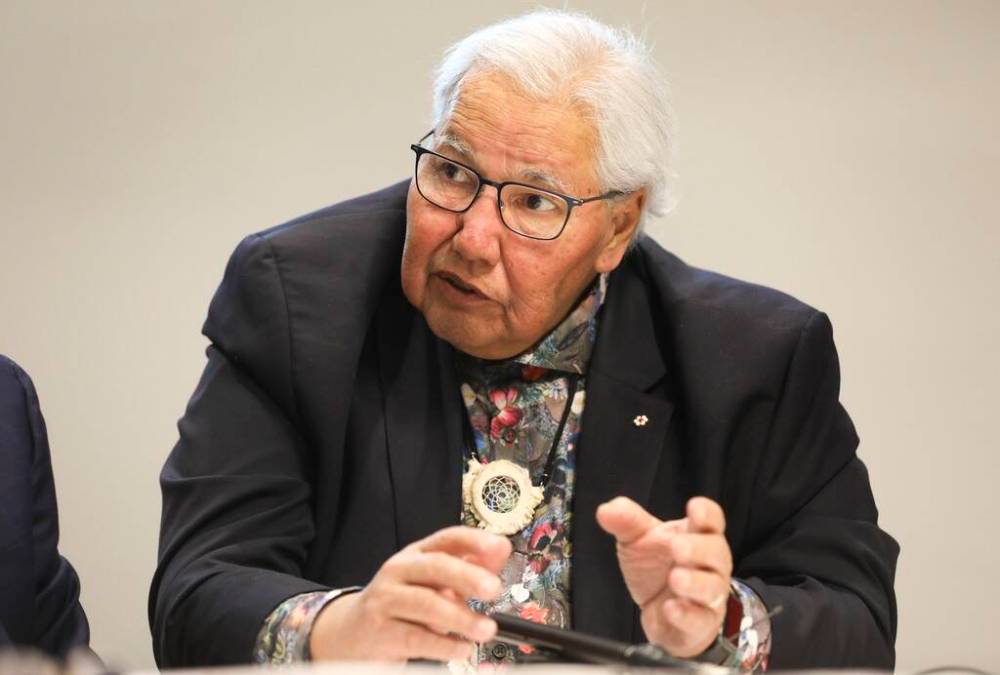Judge raps Manitoba for keeping foster kids’ baby bonus
Province urged to return $335M
Advertisement
Read this article for free:
or
Already have an account? Log in here »
To continue reading, please subscribe:
Monthly Digital Subscription
$0 for the first 4 weeks*
- Enjoy unlimited reading on winnipegfreepress.com
- Read the E-Edition, our digital replica newspaper
- Access News Break, our award-winning app
- Play interactive puzzles
*No charge for 4 weeks then price increases to the regular rate of $19.00 plus GST every four weeks. Offer available to new and qualified returning subscribers only. Cancel any time.
Monthly Digital Subscription
$4.75/week*
- Enjoy unlimited reading on winnipegfreepress.com
- Read the E-Edition, our digital replica newspaper
- Access News Break, our award-winning app
- Play interactive puzzles
*Billed as $19 plus GST every four weeks. Cancel any time.
To continue reading, please subscribe:
Add Free Press access to your Brandon Sun subscription for only an additional
$1 for the first 4 weeks*
*Your next subscription payment will increase by $1.00 and you will be charged $16.99 plus GST for four weeks. After four weeks, your payment will increase to $23.99 plus GST every four weeks.
Read unlimited articles for free today:
or
Already have an account? Log in here »
Hey there, time traveller!
This article was published 19/05/2022 (1297 days ago), so information in it may no longer be current.
OTTAWA — A judge has ruled that Manitoba shortchanged children in foster care by clawing back the federal baby bonus, and that the practice amounts to discrimination against Indigenous and disabled children.
Advocates say Wednesday’s ruling will be a major test of the Stefanson government’s commitment to a new relationship with Indigenous peoples.
“If the province appeals, and continues to appeal, that would indicate that they’re not really interested in reconciliation,” former justice Murray Sinclair said.

RUTH BONNEVILLE / FREE PRESS FILES
Murray Sinclair was co-commissioner of the Aboriginal Justice Inquiry in 1991.
Families Minister Rochelle Squires didn’t grant an interview Thursday.
Instead, a statement attributed to her said the government is reviewing the ruling.
“Our government is committed to protecting the most vulnerable children in care and has taken steps to transform the child welfare system and reduce the number of children in care in the spirit of reconciliation with Indigenous peoples,” reads the statement.
The Court of Queen’s Bench ruling involves $335 million that Ottawa sent foster-care agencies. Known as the Children’s Special Allowance, the payment is on par with the Canada Child Benefit and the disability stipends that parents of children outside of foster care receive.
The ruling relates to a handful of lawsuits by First Nations organizations, who charged that the former NDP government was wrong to compel foster agencies to apply for the federal cash and send it to the province’s general revenues, a practice that started in 2006.
The PCs opposed that practice while in opposition, but kept it in place after forming government in 2016, up until 2019, and argued the cash helps the province pay for foster care.
Both governments withheld funds from foster agencies who decided against applying for the federal cash, and those who took the cash without sending it to the province.
Judge James Edmond agreed with the plaintiffs that the province was not allowed to “frustrate and undermine the purpose of the federal law,” which specifically said the baby bonus must be used for things such as food, clothing, transit to jobs, education savings or summer camp.
The plaintiffs argued the PC government had no right to quash lawsuits that were filed over the clawback.
Manitoba’s 2020 budget retroactively deemed the federal stipends to be an overpayment that child-welfare agencies owed to the province, which could thus not be pursued in court.
The budget specifically cancelled two lawsuits.
The judge struck down the section of the law that formalized the clawback and banned legal action. The ruling paves the way for a potential lawsuit to recoup the money.
The NDP and PC governments had effectively frozen foster care funding rates from 2012 to 2019.
In that period, Manitoba paid the lowest or second-lowest rates of any Canadian jurisdiction. Roughly 90 per cent of children in care in Manitoba are Indigenous.
“There is insufficient evidence to establish that Manitoba replaced the (baby bonus) with additional funding. In fact, the evidence is to the contrary,” the judge wrote.
Edmond also ruled that the clawbacks amount to discrimination.
That’s because First Nations children who live on a reserve — whose care is entirely in the federal realm — got their baby bonus in full, in addition to gradual increases in foster-care funding. Their peers who live off-reserve under the provincial system were short-changed. Families with kids outside of foster care got their full Canada Child Benefit and disability benefit.
“While the (policy) did not specifically target Indigenous children in care, it overwhelmingly impacts the Indigenous children and disabled children in care,” the judge wrote.
He found this directly contravenes the 2011 agreement that dictates how Manitoba delivers foster care, which states agencies “should provide services in a manner that is reasonable comparable, both on-reserve and off-reserve.”
The ruling did not award compensation, since that is being handled in a separate class-action lawsuit.

But a court could use this ruling to justify payouts if it certifies that lawsuit.
Roughly $250 million of the clawed-back funds relate to First Nations and Métis families, whereas about $85 million was intended for non-Indigenous children.
The money includes disability benefits that Ottawa had issued for children in either category.
The plaintiff lawyers urged the Manitoba government not to appeal the ruling, and instead proceed to compensation.
“This should be something that Manitoba comes forward with proactively, and would work together to get it done as soon as possible,” said Shawn Scarcello.
Marc Miller, the federal Crown-Indigenous relations minister, praised the ruling and called Manitoba’s clawbacks “unconscionable.”
“To take from one side and move to the other, is not a way to move forward on the relationship that we have with Indigenous peoples, which is a joint responsibility,” he told the Free Press.
In the Manitoba legislature Thursday, NDP Indigenous affairs critic Ian Bushie chastised the PCs for “trying… to legislate away the voice of Indigenous children,” but refused to say multiple times whether his party was wrong to impose the clawback while it governed.
Liberal Leader Dougald Lamont said the NDP needs to own up to “tearing apart Indigenous families” through the policies it enacted.
“The NDP government did it worse than anyone else, and they’re completely incapable of admitting it, or accepting their responsibility for it,” Lamont said.
“There are kids right now, who had money taken from them, who are on the street, who are sleeping under bridges and plenty of them have been sexually trafficked, some of them are in jail, and some of them, frankly, are dead.”
Pimicikamak Chief David Monias said those who were deprived of money need help immediately.
“Having access to these funds can improve the lives of countless children,” he wrote.
“It is not the children’s responsibility to subsidize the provincial CFS system.”
Lake Manitoba Chief Cornell McLean put it more starkly.
“Anyone can see that this was a blatant attempt to literally steal money from our children, and from our ability to create positive outcomes for them,” he wrote. “What this provincial government was trying to do was wrong and shameful.”
dylan.robertson@freepress.mb.ca
History
Updated on Thursday, May 19, 2022 8:39 PM CDT: Write-thru


